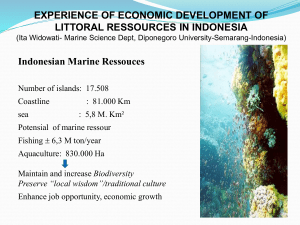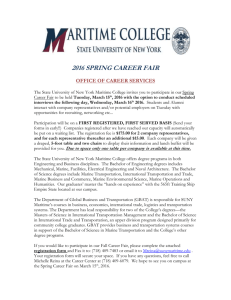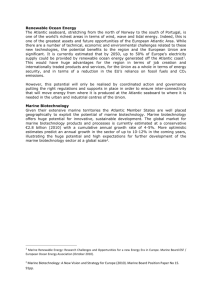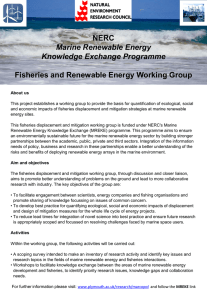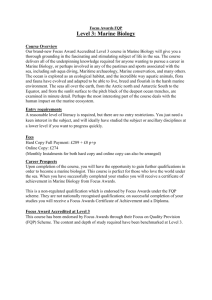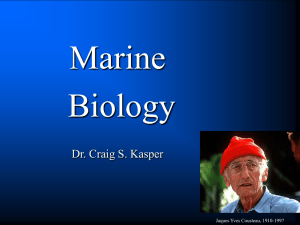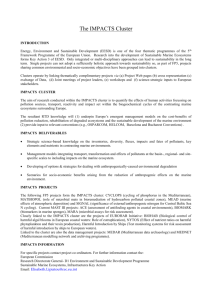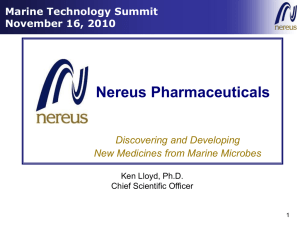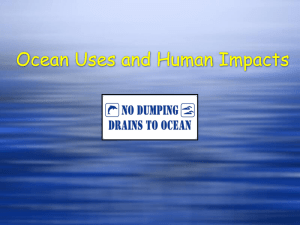Study visit report-Low carbon, energy and environment
advertisement
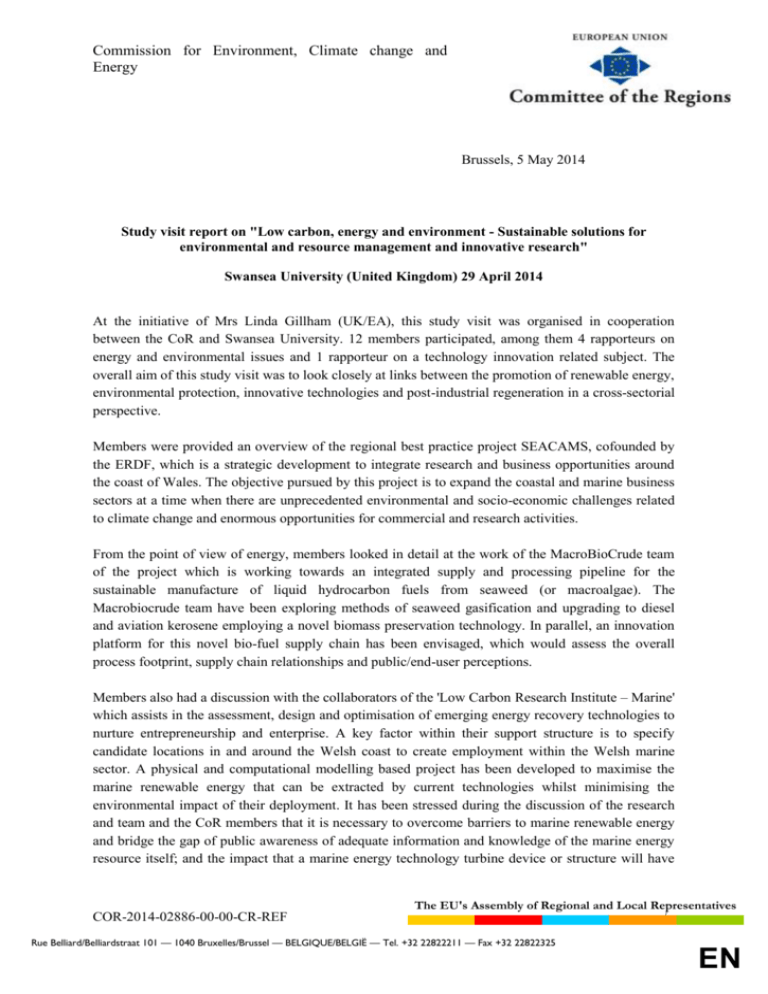
Commission for Environment, Climate change and Energy Brussels, 5 May 2014 Study visit report on "Low carbon, energy and environment - Sustainable solutions for environmental and resource management and innovative research" Swansea University (United Kingdom) 29 April 2014 At the initiative of Mrs Linda Gillham (UK/EA), this study visit was organised in cooperation between the CoR and Swansea University. 12 members participated, among them 4 rapporteurs on energy and environmental issues and 1 rapporteur on a technology innovation related subject. The overall aim of this study visit was to look closely at links between the promotion of renewable energy, environmental protection, innovative technologies and post-industrial regeneration in a cross-sectorial perspective. Members were provided an overview of the regional best practice project SEACAMS, cofounded by the ERDF, which is a strategic development to integrate research and business opportunities around the coast of Wales. The objective pursued by this project is to expand the coastal and marine business sectors at a time when there are unprecedented environmental and socio-economic challenges related to climate change and enormous opportunities for commercial and research activities. From the point of view of energy, members looked in detail at the work of the MacroBioCrude team of the project which is working towards an integrated supply and processing pipeline for the sustainable manufacture of liquid hydrocarbon fuels from seaweed (or macroalgae). The Macrobiocrude team have been exploring methods of seaweed gasification and upgrading to diesel and aviation kerosene employing a novel biomass preservation technology. In parallel, an innovation platform for this novel bio-fuel supply chain has been envisaged, which would assess the overall process footprint, supply chain relationships and public/end-user perceptions. Members also had a discussion with the collaborators of the 'Low Carbon Research Institute – Marine' which assists in the assessment, design and optimisation of emerging energy recovery technologies to nurture entrepreneurship and enterprise. A key factor within their support structure is to specify candidate locations in and around the Welsh coast to create employment within the Welsh marine sector. A physical and computational modelling based project has been developed to maximise the marine renewable energy that can be extracted by current technologies whilst minimising the environmental impact of their deployment. It has been stressed during the discussion of the research and team and the CoR members that it is necessary to overcome barriers to marine renewable energy and bridge the gap of public awareness of adequate information and knowledge of the marine energy resource itself; and the impact that a marine energy technology turbine device or structure will have COR-2014-02886-00-00-CR-REF The EU's Assembly of Regional and Local Representatives Rue Belliard/Belliardstraat 101 — 1040 Bruxelles/Brussel — BELGIQUE/BELGIË — Tel. +32 22822211 — Fax +32 22822325 .../... EN -2on the natural marine environment The lack of knowledge of the impact of any new technology will hinder planning permission and consent from authorities to proceed. The impact a marine energy project has on the marine and aquatic environment may be far reaching and indirect, and hence this project looks at a full range of aspects in the analysis; from cloud to coast; water quality to flood risk, ground water to sedimentation. These project activities provided a best practice example which allowed members to discuss in more practical detail the possibilities for better EU support in terms of funding and governance solutions with a view to encouraging investment in innovative renewable energy projects. It was generally felt that best practice from across the EU was crucial to understand how to ensure that the EU funding, private investment and cross-border cooperation are purposefully combined to bring significant environmental, societal and economic benefits to a region. Moreover, a tour of the aquatic research facilities took place, where the Swansea University's blue biotechnology research is helping to address global food and fuel security issues. The programme continued with a visit to a flagship wetland centre on the outskirts of Swansea; a triumph of postindustrial regeneration and nationally important ecological site. At the margins of the various arrangements, discussions took place between the Welsh MEP Mr Vaughan and members and accompanying staff. Mr Vaughan's involvement in CoR related issues at the EP has been noted and further reciprocal exchange envisaged, notably in relation to the CoR session of the Energy Week in June. Members commended the innovative success of the projects presented by the host and noted outstanding issues for their future political work in the field of energy and the environment, notably in relation to commercial viability of pilot project replication for regional growth and jobs in the currently sluggish economic atmosphere across the EU. COR-2014-02886-00-00-CR-REF
